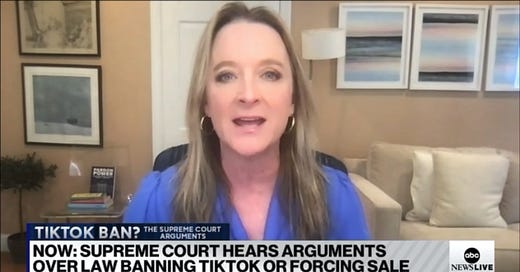What's going on with the TikTok case?
At its core, the First Amendment challenge is about whether China or Congress is the bigger threat
The day before Trump takes office, an act of Congress banning Apple and Google from offering the TikTok app if it’s still owned by a Chinese-affiliated company goes into effect. Once again, the power over this complex issue affecting millions is in the hands of 5 unelected judges, this time under the auspices of the First Amendment.
Based on last Friday’s oral argument, it’s unlikely they will strike the law down, but they could pause if to allow Donald Trump to do whatever he feels like doing with TikTok and China. He filed a brief asking for that, after all.
This newsletter is my contribution to civic education. Please share it widely—and consider upgrading to paid. Thank you!
In April 2024, the Protecting Americans from Foreign Adversary Controlled Applications Act (“The Act”) was enacted. It made it illegal for third-party service providers (such as Google or Apple) to host or update a “foreign adversary application” for mobile phones in America.
In other words, the Act prohibits companies from offering TikTok in their app stores for users in the United States so long as it remains owned by a foreign-affiliated adversary—in this case, China.
The last time Trump was in office, he issued an executive order in 2020 ordering the company that owns TikTok (ByteDance) to divest itself of TikTok in the United States. However, late last month, he filed an amicus brief in the Supreme Court, essentially asking for the Court to pause the legislation and withhold a decision. His argument? That he, Trump himself, has the distinct and profound skills to resolve the dispute.
As I wrote for The Bulwark, Trump’s filing should be the final wake-up call that our democracy is at risk of falling into an authoritarian society or worse.
What’s the background of this case?
After the Act was passed last Spring, a handful of parties came forward to challenge it: ByteDAnce Ltd. and TikTok Inc., Based Politics Inc., and eight individual app users collectively referred to as “The Creators.” Last month, the D.C. Circuit Court of Appeals denied the petitioners' challenge to the Act and their request to delay implementing the ban until the Supreme Court of the United States could hear the case.
Then, just a few days later, the petitioners filed an “Emergency Application for an Injunction Pending Supreme Court Review” in the Supreme Court. They argued that the justices needed to intervene and help stop what would “shutter one of America’s most popular speech platforms the day before a presidential inauguration.”
The American government is concerned that ByteDance, TikTok’s parent company, does not operate independently from the Chinese government and, therefore, the ownership of the app’s algorithm poses a severe national security threat by collecting many American citizens’ data and control over the app’s content.
So Congress passed the Act to prevent China from secretly manipulating the widespread use of TikTok to boost its global political position and create a feeling of distrust among Americans.
To keep TikTok in American app stores, ByteDance has to sell its ownership of the app to an American company or a company operated and controlled by an American ally before next Sunday.
Otherwise, the app will remain on users’ phones who have already downloaded it, but they will lose the ability to update it. Eventually, the app will stop working in the United States because the Act prohibits companies from selling it on their app stores to United States smartphone users.
TikTok and the other petitioners argue that Congress is unfairly and unconstitutionally singling the app out and that the Act infringes on the First Amendment’s right to free speech. Additionally, they argue that it is impossible to sell the app to a United States company by January 19th. As for the national security concerns, petitioners argue those could be resolved with a simple warning to American users that their government is worried about China misusing their data.
The Department of Justice argues that there is no First Amendment issue because ByteDance is a foreign company that operates in China, not the United States, eliminating any First Amendment right to be controlled. And, if we were to assume it did apply, the government added, the “grave national security threats” posed by TikTok under ByteDance’s ownership outweigh any free speech concerns. The DOJ further argues that TikTok users don’t have a right to post content on a “platform controlled by a foreign adversary.”
What did Trump’s brief say?
Keep reading with a 7-day free trial
Subscribe to Simple Politics with Kim Wehle to keep reading this post and get 7 days of free access to the full post archives.




